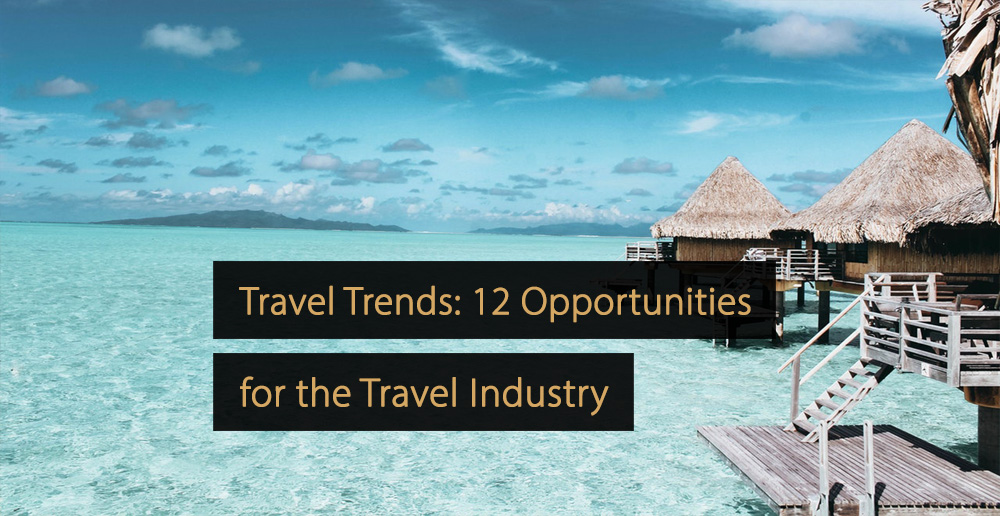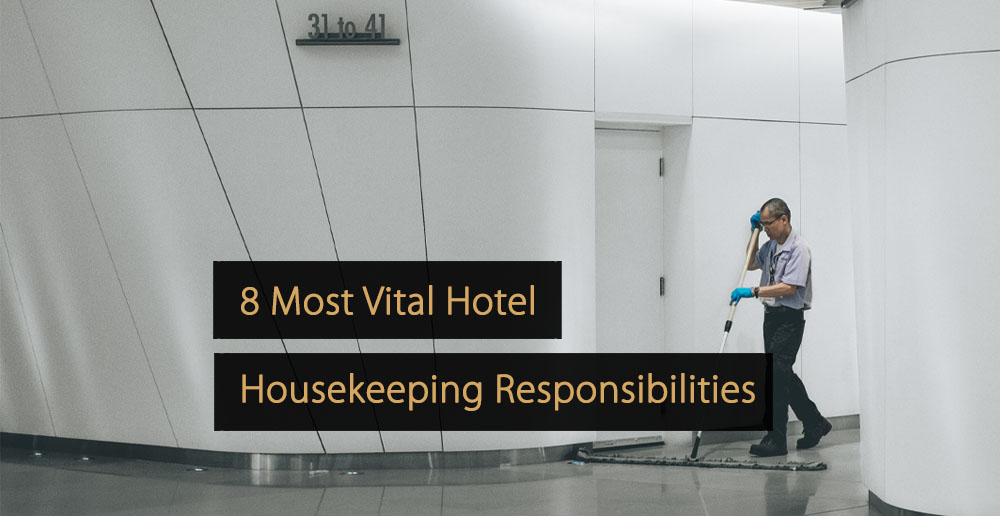The travel industry is constantly evolving, and the pace of change is faster than ever, as emerging technology and shifting demographics alter expectations and standard practices. This has been further exacerbated by COVID-19, which has disrupted almost all aspects of travel. Of course, there are real opportunities for companies to keep pace with the latest travel trends and embrace new business methods.
Why Is It Important to Keep Up With the Latest Travel Trends?
Staying on top of travel trends is vital for any business in the travel industry, whether in the hospitality sector, transport, or entertainment. Customers expect the businesses they patronize to offer the latest innovations. While fads may come and go, some travel trends indicate the direction of the industry; identifying and embracing these trends is vital to remaining relevant in the future.
Key Takeaways:
- Prioritization of Hygiene and Safety: The outbreak has heightened the importance of hygiene and safety measures in the travel industry, making them key factors in customer purchasing decisions.
- A Greater Focus on Leisure Travel: The outbreak has heightened the importance of hygiene and safety measures in the travel industry, making them key factors in customer purchasing decisions.
- Emphasis on Local (vs. International): The outbreak has heightened the importance of hygiene and safety measures in the travel industry, making them key factors in customer purchasing decisions.
- Wider Adoption of Contactless Payments: The outbreak has heightened the importance of hygiene and safety measures in the travel industry, making them key factors in customer purchasing decisions.
- The Power of Virtual Reality: The outbreak has heightened the importance of hygiene and safety measures in the travel industry, making them key factors in customer purchasing decisions.
5 Coronavirus-Related and More General Travel Trends
The current and emerging travel trends can be broadly divided into trends that are related to the outbreak of COVID-19 and trends that are relevant at all times. In order to fully keep pace with the evolution of the travel industry, it is important to be aware of the trends within both of these categories.
Prioritisation of Hygiene and Safety – The COVID outbreak has heightened the importance of hygiene and safety measures in the travel industry, making them key factors in customer purchasing decisions, necessitating companies to implement and emphasize such measures in their marketing to ensure both public safety and positive brand perception. Read more
A Greater Focus on Leisure Travel – The travel industry is adapting to the cancellation of business events by shifting focus to leisure travel, prompting changes in marketing strategies to target families, groups, couples, and other demographics still interested in booking trips despite the pandemic. Read more
Emphasis on Local (vs. International) – Amid travel restrictions and international travel anxiety, a significant COVID-related travel trend involves prioritizing local customers, prompting businesses to tailor marketing messages and highlight features appealing to locals, such as gyms, saunas, Wi-Fi access, and rooms as temporary work offices, while still maintaining an international focus. Read more
Wider Adoption of Contactless Payments – Contactless payment, already a significant travel technology trend, has gained increased importance during COVID as it not only minimizes shared surfaces, aligning with hygiene measures, but also enhances convenience and expedites payment processes, fostering a sense of safety for customers and promoting spontaneous purchases to maximize revenue for travel businesses. Read more
The Power of Virtual Reality – Virtual reality technology, a breakthrough trend, plays a pivotal role in the travel industry, offering digital experiences that showcase destinations, properties, and attractions, providing certainty for travelers in the COVID era and facilitating corporate or event bookings by allowing customers to explore facilities remotely without the need for in-person visits. Read more
5 Coronavirus-Related and More General Travel Trends
The current and emerging travel trends can be broadly divided into trends that are related to the outbreak of COVID-19 and trends that are relevant at all times. In order to fully keep pace with the evolution of the travel industry, it is important to be aware of the trends within both of these categories.
1. Prioritisation of Hygiene and Safety
The COVID outbreak has heightened the importance of hygiene and safety measures in the travel industry, making them key factors in customer purchasing decisions, necessitating companies to implement and emphasize such measures in their marketing to ensure both public safety and positive brand perception. Read more
2. A Greater Focus on Leisure Travel
The travel industry is adapting to the cancellation of business events by shifting focus to leisure travel, prompting changes in marketing strategies to target families, groups, couples, and other demographics still interested in booking trips despite the pandemic. Read more
3. Emphasis on Local (vs. International)
Amid travel restrictions and international travel anxiety, a significant COVID-related travel trend involves prioritizing local customers, prompting businesses to tailor marketing messages and highlight features appealing to locals, such as gyms, saunas, Wi-Fi access, and rooms as temporary work offices, while still maintaining an international focus. Read more
4. Wider Adoption of Contactless Payments
Contactless payment, already a significant travel technology trend, has gained increased importance during COVID as it not only minimizes shared surfaces, aligning with hygiene measures, but also enhances convenience and expedites payment processes, fostering a sense of safety for customers and promoting spontaneous purchases to maximize revenue for travel businesses. Read more
5. The Power of Virtual Reality
Virtual reality technology, a breakthrough trend, plays a pivotal role in the travel industry, offering digital experiences that showcase destinations, properties, and attractions, providing certainty for travelers in the COVID era and facilitating corporate or event bookings by allowing customers to explore facilities remotely without the need for in-person visits. Read more
5 Coronavirus-Related and More General Travel Trends
The current and emerging travel trends can be broadly divided into trends that are related to the outbreak of COVID-19 and trends that are relevant at all times. In order to fully keep pace with the evolution of the travel industry, it is important to be aware of the trends within both of these categories.
1. Prioritisation of Hygiene and Safety
The COVID outbreak has heightened the importance of hygiene and safety measures in the travel industry, making them key factors in customer purchasing decisions, necessitating companies to implement and emphasize such measures in their marketing to ensure both public safety and positive brand perception.
6 Travel Trends Associated With COVID
Below, you can learn much more about some of the main travel trends that are connected to the coronavirus pandemic and the various ways it has disrupted travel and altered the behaviour of travellers.
1. Prioritisation of Hygiene and Safety
Since the beginning of the COVID outbreak, a focus has been placed on reducing the spread through hygiene and safety measures. Depending on the setting and local regulations, these measures may require travel industry companies to provide hand gel, facilitate social distancing, require mask-wearing and/or generally improve cleanliness.
Clearly, both hygiene and safety measures have always been necessary, but they have emerged as one of the major travel trends because, against the backdrop of COVID, they are now a key focus area for customers when making purchasing decisions. With this in mind, it is critical that companies highlight hygiene and safety steps in their marketing content, and actually take the necessary actions to keep people safe and avoid negative publicity.
Read “Tips to Highlight Safety in Marketing & Guest Communication in Travel” for more information.
2. A Greater Focus on Leisure Travel
One of the most significant travel trends to be aware of relates to business events. With travel restrictions, limits on household mixing in certain countries, and an emphasis on working from home, many of these events are being cancelled and fewer events are being booked in the first place. This is encouraging certain travel companies to adapt.
In some cases, those involved in travel management may wish to switch their focus away from business customers, towards leisure. While leisure travel has also been affected by the pandemic, there is still significant demand for travel, people within the same household are able to travel more easily, and holiday periods can still bring in customers.
In these situations, it may be necessary to make changes to your overall travel marketing strategy, placing a greater focus on families, groups of friends, couples and other demographics who may still be keen to book with you.
3. Emphasis on Local (vs. International)
With travel restrictions and quarantine requirements in place in certain countries, along with more generalised anxiety around international travel, another of the major COVID related travel trends has involved emphasising local customers. In this context, local may mean travellers from your own country, or from a neighbouring country.
Focusing efforts locally may mean altering marketing messages to appeal to different audiences, and it can also involve promoting features that are likely to appeal more to locals. For hotels, for example, this could mean promoting facilities and features like gyms, saunas, Wi-Fi access and rooms as temporary work offices.
Of course, this does not mean turning your back on international customers entirely, but simply shifting your focus.
4. Wider Adoption of Contactless Payments
Contactless payment has been a major travel technology trend for some time now, but the situation with COVID has made this even more important. Accepting contactless payments is a great way to convince your customers that you are taking the necessary steps to protect them by minimising the number of shared surfaces they need to touch.
Aside from the hygiene benefits of using contactless payments as much as possible, the technology can also provide travellers with greater convenience and a swifter payment process. This can also be useful for encouraging spontaneous purchases, which can help your travel business to maximise revenue.
Video: How Contactless Payments Work?
Read “4 Reasons why Contactless Payments are Becoming Popular Within the Travel Industry” for more on this topic.
5. The Power of Virtual Reality
Virtual reality technology has been one of the breakthrough technology trends of recent times and its role within the travel industry exceeds almost any other area of usage. After all, virtual reality allows for destinations to be showcased, properties to be viewed and attractions to be explored, all via a digital experience.
This can be especially helpful in the COVID era, when travellers want certainty that they are going to the right place. It can also help organisations that take corporate bookings or event bookings, because these customers will have the option to fully explore facilities without needing to travel for in-person viewing.
Video: A Guided City Tour (360 VR Video) of Rome
Find more detailed information and examples about how virtual reality can benefit your business in the article “How Virtual Reality is Transforming the Travel Industry”.
6. Voice Control Technology
The voice control technology is another means by which travel companies can provide touch-free environments and reduce the risks associated with COVID. This particular travel trend has been especially prevalent within the hotel industry, where a growing number of companies are using voice-controlled devices within their hotel rooms.
This provides guests with the ability to adjust their room’s temperature, turn on the television, change channels, contact the front desk and much more, all using smart speakers or a voice-controlled hub. The same technology can be easily applied to other areas of the travel industry too, providing further layers of both safety and convenience.
To learn more about this, read the “How Can Voice Control Benefit the Travel Industry?” article.
11 More General Travel Trends for the Travel Industry
In this section, you read about some of the more general travel trends you are going to need to understand and embrace. These trends have relevance throughout the industry, at any time.
1. Voice Search Travel
A significant travel technology trend that has been emerging over recent years involves the use of voice search to book travel or learn about travel destinations. This has been aided by the growing number of smart speakers and similar products on the market, including Amazon Echo and Google Home, along with digital assistants like Alexa and Siri.
Capitalising on this involves a process that shares similarities to what website designers went through with mobile optimisation several years ago. Here, however, websites need to be optimised to gain visibility in Google’s featured snippets, while airline and hotel booking engines need to be configured to allow voice search to be used. Voice search is expected to continue to grow in the years ahead, so it is sensible to capitalise on this immediately.
Video: Book Your Travel trip With Voice Search
To learn more about this, read the “Voice Search for the Tourism & Travel industry: All You Need to Know!” article.
2. Personalisation
| Use Case | Description | Benefit for Hotel | Risk |
|---|---|---|---|
| Chatbots for Customer Service | Implement AI-powered chatbots for support. | Benefit: Provides instant customer service, reducing workload on human staff and improving guest satisfaction. | Risk: Misinterpretation of queries, leading to incorrect responses and potential dissatisfaction. |
| Personalized Recommendations | Use AI algorithms for personalized suggestions. | Benefit: Enhances guest experience by offering tailored services and activities, leading to increased customer loyalty. | Risk: Privacy concerns regarding the collection and use of guest data for personalization. |
| Predictive Maintenance | Employ AI to predict and prevent equipment issues. | Benefit: Reduces downtime and maintenance costs by addressing potential problems before they impact guest services. | Risk: Relies on accurate data and models; false predictions may lead to unnecessary maintenance expenses. |
Personalisation is a hot travel trend these days, especially in marketing, is increasingly easy in today’s data-driven world. It’s also increasingly important. Personalised marketing takes data regarding a client and uses this to tailor advertising and promotion specifically to that person. A simple example would be the targeted ads that appear in your web browser when you visit certain sites, which use information derived from your browsing habits and prior purchases to show you products that might interest you. A regular traveller might be offered deals on plane or rail tickets, or useful gadgets such as adapters, power banks or noise-cancelling headphones.
Video: Personalisation in Travel
Find more detailed information and examples of “Personalisation marketing” in the travel industry in the article “5 Ways Personalisation Marketing is Used in the Travel Industry”.
Grow Your Bookings by Linking With Travel Agencies
In the last decade, the biggest travel trend is the shift from off-line booking to online booking behaviour. A travel agency will be able to reach travel customers who mostly do not book with individual companies directly. Linking with travel agencies can therefore help to optimise and grow your bookings.
Meet the most important travel agencies in our article “Grow Your Bookings by Linking With Travel Agencies”, and learn about ways to best benefit from linking with them.
You may already have adopted some of these travels trends as part of your own business model. Other travel trends may seem more esoteric, particularly those relating to emerging technologies. Even so, it’s important to get on board now if you don’t want to be left behind.
More Tips to Grow Your Business
Revfine.com is a knowledge platform for the hospitality & travel industry. Professionals use our insights, strategies and actionable tips to get inspired, optimise revenue, innovate processes and improve customer experience. You can find all hotel & hospitality tips in the categories Revenue Management, Marketing & Distribution, Hotel Operations, Staffing & Career, Technology and Software.| Column 1 | Column 2 | Column 3 |
|---|---|---|
| Column 1 Value | Column 2 Value | Column 3 Value |
| Column 1 Value 2 | Column 2 Value 2 | Column 3 Value 2 |
Personalisation is a hot travel trend these days, especially in marketing, is increasingly easy in today’s data-driven world. It’s also increasingly important. Personalised marketing takes data regarding a client and uses this to tailor advertising and promotion specifically to that person. A simple example would be the targeted ads that appear in your web browser when you visit certain sites, which use information derived from your browsing habits and prior purchases to show you products that might interest you. A regular traveller might be offered deals on plane or rail tickets, or useful gadgets such as adapters, power banks or noise-cancelling headphones.
| Prioritisation of Hygiene and Safety | The COVID outbreak has heightened the importance of hygiene and safety measures in the travel industry, making them key factors in customer purchasing decisions, necessitating companies to implement and emphasize such measures in their marketing to ensure both public safety and positive brand perception. | |
| A Greater Focus on Leisure Travel | The travel industry is adapting to the cancellation of business events by shifting focus to leisure travel, prompting changes in marketing strategies to target families, groups, couples, and other demographics still interested in booking trips despite the pandemic. |
Frequently Asked Questions (Normal Accordion)
1. Sustainability
2. Hotel Technology
3. Slow Tourism
NFTs and the Metaverse.
1. Artificial Intelligence
2. Renewable Energy
3. Personalization Marketing






Test